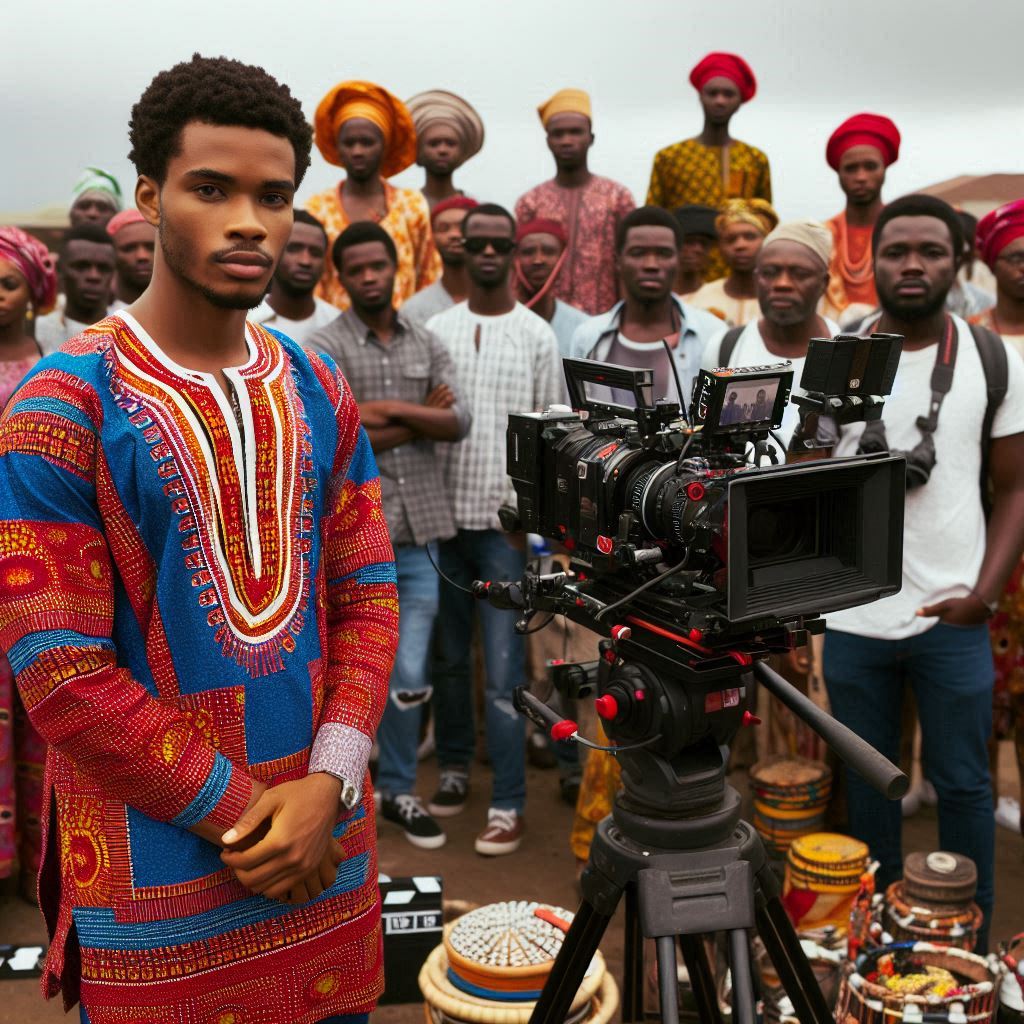Introduction
Television in Nigeria has a rich and dynamic history. It began in the early 1960s when the Western Nigeria Television Service (WNTV) was established in Ibadan.
This significant milestone marked Nigeria as the first African country to embrace television broadcasting. The launch of WNTV in 1959 set the stage for the development of television across Nigeria.
By the mid-1960s, other regions followed suit, leading to a rapid expansion of television services nationwide.
Early Days of Nigerian Television
In the early days, television was primarily a tool for education and information dissemination. The government utilized it to inform the public and promote development initiatives.
Educational programs were broadcast to enhance literacy and public awareness. Entertainment was also an integral part, with dramas and musical shows becoming popular.
Despite limited technology, early Nigerian television had a profound impact on society.
Growth and Development
The 1970s and 1980s saw significant growth in Nigerian television production. More television stations were established, increasing competition and improving quality.
The Nigerian Television Authority (NTA) was created in 1977, consolidating existing stations under one umbrella. This era also witnessed the introduction of color television, enhancing viewer experience.
Production techniques improved, leading to better-quality programs and wider audience appeal.
The Role of Television in Shaping Culture
Television has played a crucial role in shaping Nigerian culture. It has been a mirror reflecting societal values and changes. Television dramas and comedies have highlighted cultural norms, traditions, and societal issues.
Programs like “Village Headmaster” and “Cockcrow at Dawn” became household names, addressing social issues and promoting national unity.
Through television, diverse Nigerian cultures have been showcased to the world.
Television and the Entertainment Industry
The entertainment industry in Nigeria owes much of its success to television. It provided a platform for talents to showcase their skills and gain popularity.
Music, film, and theatre artists gained nationwide fame through television appearances. Shows like “Nigerian Idol” and “Gulder Ultimate Search” launched many careers.
Television has been instrumental in the growth of Nollywood, making it one of the largest film industries globally.
Technological Advancements
Technological advancements have transformed Nigerian television production. The transition from analog to digital broadcasting has improved picture and sound quality.
Modern equipment and editing software have revolutionized production processes. The internet and social media have expanded the reach of television content.
Viewers can now access programs on multiple platforms, increasing viewership and engagement.
Challenges and Future Prospects
Despite its growth, Nigerian television production faces challenges. Funding, piracy, and inadequate infrastructure are significant hurdles.
However, the future looks promising with increasing investments and technological innovations. The industry is poised for further growth, contributing to Nigeria’s cultural and economic development.
In general, Television has significantly impacted Nigerian society and culture. From its inception to the present day, it has evolved and grown, shaping and reflecting the nation’s identity.
With continued investment and innovation, Nigerian television production will keep advancing, playing a pivotal role in the country’s future.
Early Television Productions in Nigeria
Overview of the First Television Station in Nigeria
Nigeria’s television history began on October 31, 1959, with the launch of Western Nigeria Television (WNTV). This groundbreaking station, located in Ibadan, was the first of its kind in Africa.
WNTV marked a significant technological leap for Nigeria, symbolizing progress and modernity. The station’s establishment was spearheaded by Chief Obafemi Awolowo, the Premier of the Western Region.
His visionary leadership played a pivotal role in bringing television to Nigeria. WNTV initially broadcast in black and white and was primarily funded by the government.
This pioneering move by the Western Region inspired other regions to follow suit, leading to the establishment of more television stations across the country.
Description of the Early Television Shows Produced
Early Nigerian television shows focused on education, entertainment, and information. One of the earliest and most popular shows was “Village Headmaster.”
This program provided social commentary on community life and aired for over two decades. Another notable show was “Koko Close,” a comedy series that entertained audiences with its humorous depiction of everyday Nigerian life.
Educational programs like “Teens Time” and “Junior Request” aimed at engaging young audiences with informative content. Music and variety shows like “Bar Beach Show” showcased local talent and cultural performances.
Nigerian news programs began to establish themselves, with the “Nigerian Television News” becoming a staple. These early shows set the stage for a vibrant television industry, reflecting and shaping Nigerian society.
Influence of Foreign Content on Nigerian Television
Foreign content played a significant role in shaping early Nigerian television. American, British, and Indian shows dominated the airwaves, influencing local productions.
Popular foreign series like “The Adventures of Robin Hood” and “Bonanza” captivated Nigerian audiences with their storytelling and production values. Hollywood movies and British dramas provided a template for local producers and writers.
The influence of Bollywood was evident in the musical and dramatic elements of early Nigerian shows. Nigerian producers began adapting foreign formats to fit local contexts, creating a unique blend of global and local content.
This cross-cultural exchange helped elevate the quality of Nigerian television production.
Despite the dominance of foreign content, Nigerian shows gradually found their unique voice, blending indigenous stories with modern production techniques.
Inconclusion, The early days of Nigerian television were marked by innovation and adaptation. WNTV’s launch heralded a new era in African broadcasting.
Early television shows reflected Nigerian culture while drawing inspiration from foreign content. This period laid the foundation for a thriving television industry, blending local and global influences.
Nigerian television has since evolved, but the legacy of its early productions continues to influence contemporary media.
As the industry grows, the lessons from these early days remain crucial, highlighting the importance of cultural representation and technological advancement.
Read: Developing Critical Thinking in Language Arts
Growth and Development of Nigerian Television Production
Impact of NTA on Television Production in Nigeria
The Nigerian Television Authority (NTA) launched in 1977. It revolutionized television production in Nigeria. NTA established the first nationwide television network in Africa.
This allowed for the broadcast of diverse programs across the country. It standardized production techniques and quality, setting a high bar for others.
NTA’s nationwide reach unified the diverse Nigerian audience through shared content. It provided a platform for showcasing Nigeria’s rich cultural heritage and values.
NTA also played a crucial role in educational programming, enhancing literacy and learning.
Introduction of Local Content and Nigerian Stories
Initially, Nigerian television heavily relied on foreign content. This trend began to shift in the late 1980s. Local content started gaining prominence on Nigerian television.
Producers and directors realized the importance of telling Nigerian stories. They created content that resonated with the local audience.
This shift helped in preserving Nigerian culture and traditions. Local stories highlighted societal issues and celebrated Nigerian achievements.
The government’s policy on indigenization in the media sector further encouraged local productions. Nigerian filmmakers and television producers began to shine.
Emergence of Popular Television Series and Dramas
The introduction of local content led to the creation of popular TV series and dramas. In the 1980s, “Cockcrow at Dawn” captured the hearts of many Nigerians.
This series showcased rural life and the challenges of agricultural development. “Village Headmaster” also gained immense popularity.
It depicted life in a typical Nigerian village, blending humor with societal lessons. The 1990s saw the rise of series like “Checkmate”.
This urban drama highlighted contemporary issues and family dynamics. “Fuji House of Commotion” provided comic relief while addressing family matters.
Continued Evolution and Future Prospects
Today, Nigerian television production continues to grow and diversify. Platforms like Africa Magic showcase a wide range of Nigerian content.
Nigerian series and dramas now reach a global audience through streaming services. The rise of Nollywood has also influenced television production quality.
Producers now incorporate high production values and compelling storytelling. The future of Nigerian television production looks promising. With continued investment and talent development, it can achieve greater heights.
In essence, Nigerian television production has evolved significantly over the decades. The NTA’s impact, the introduction of local content, and the emergence of popular series have driven this evolution.
These developments have shaped a vibrant and dynamic television industry. The future holds even more promise as Nigerian stories continue to captivate audiences worldwide.
Read: Student Experiences: Life in Communication Arts
Challenges Faced by Nigerian Television Producers
Lack of Funding and Resources
Nigerian television producers often grapple with inadequate funding and resources. This financial shortfall limits their ability to produce high-quality content.
Many producers rely on personal funds or small-scale investors. Such funding sources rarely provide sufficient capital for advanced equipment and technologies.
As a result, production quality can suffer. Additionally, limited resources restrict the scope of television projects. Producers face challenges in securing adequate studio space and technical support.
Consequently, these constraints stifle creativity and innovation. The lack of funding also affects staff remuneration. Underpaid professionals may seek better opportunities elsewhere.
This brain drain further hampers the industry’s growth and development.
Competition from Foreign Productions
Foreign productions pose significant competition to Nigerian television producers. International shows often have bigger budgets and better resources.
This allows them to produce content with superior production values. Nigerian audiences are frequently drawn to these high-quality foreign shows.
This preference can undermine local productions. Additionally, foreign shows often benefit from extensive marketing campaigns. Nigerian producers struggle to match these promotional efforts.
Limited marketing budgets hinder their ability to attract viewers. Moreover, the dominance of foreign content on Nigerian screens reduces airtime for local shows.
This limits the exposure of Nigerian productions. As a result, local producers find it challenging to build and maintain a loyal audience.
Struggles with Censorship and Regulation
Censorship and regulation pose major hurdles for Nigerian television producers. The National Broadcasting Commission (NBC) enforces strict content guidelines.
These guidelines often limit creative expression. Producers must navigate a complex web of rules and restrictions. Violating these regulations can lead to heavy fines or show cancellations.
Furthermore, the process of obtaining necessary licenses can be cumbersome. Bureaucratic delays can disrupt production schedules. Producers must also contend with unpredictable policy changes.
These shifts can create uncertainty and affect long-term planning. Additionally, regulatory bodies sometimes exhibit bias or favoritism. This can unfairly disadvantage certain producers or projects.
Navigating these regulatory challenges requires significant time and effort.
In short, Nigerian television producers face numerous challenges. These include a lack of funding and resources, intense competition from foreign productions, and struggles with censorship and regulation.
Despite these obstacles, many producers continue to create impactful and culturally significant content. Their resilience and creativity remain the backbone of Nigerian television.
Read: Communication Arts: Balancing Theory and Practice

Evolution of Technology in Nigerian Television Production
When we talk about the evolution of technology in Nigerian television production, we cannot overlook the significant shift from analog to digital production.
Shift from Analog to Digital Production
With the advancement in technology, Nigerian television production has moved away from the traditional analog methods to embrace digital production techniques. This shift has revolutionized the industry in various ways.
Introduction of High-Definition Cameras and Equipment
One of the major technological advancements in Nigerian television production is the introduction of high-definition cameras and equipment.
These modern tools have enabled producers to capture footage with exceptional clarity and sharpness, enhancing the overall visual quality of productions.
Effects of Technological Advancements on Production Quality
The utilization of high-definition cameras and equipment has had a profound impact on the quality of television productions in Nigeria.
The clarity and sharpness of images captured with these tools have elevated the overall viewing experience for audiences, making shows more engaging and immersive.
Furthermore, the use of advanced technology in production has enabled filmmakers to experiment with different visual styles and techniques, resulting in more creative and visually appealing content.
Directors and cinematographers now have a wider range of tools at their disposal to bring their artistic vision to life on screen.
Moreover, the transition to digital production has streamlined the workflow and post-production processes, allowing for faster editing, color correction, and special effects integration.
This efficiency has not only improved the speed at which television shows are produced but also enhanced the overall quality of the final product.
Overall, the evolution of technology in Nigerian television production has been instrumental in shaping the industry and raising the standards of quality.
As technology continues to advance, we can expect even more innovative and groundbreaking developments that will further revolutionize the way television content is created and consumed in Nigeria.
Read: How to Apply for Communication Arts Programs
Rise of Reality TV and Talk Shows in Nigeria
Influence of International Reality TV Shows on Nigerian Television
International reality TV shows have significantly influenced Nigerian television. Shows like Big Brother and The X Factor introduced Nigerians to new entertainment formats.
These programs highlighted the drama, excitement, and engagement reality TV offers. Nigerian producers noticed their popularity and began creating localized versions.
This adaptation helped shape the reality TV landscape in Nigeria. The success of international formats proved there was a market for reality TV. Nigerian audiences quickly embraced this new form of entertainment.
Nigerian reality TV shows often mimic their international counterparts. This replication ensures a familiar viewing experience for audiences.
Producers have learned from international shows’ success and failures. They incorporate proven elements while adding local flavors. This approach has been instrumental in the rise of Nigerian reality TV.
As a result, Nigerian shows have carved out their own space in the global television market.
Success of Local Reality TV Shows and Talk Shows
Local reality TV shows and talk shows have achieved remarkable success in Nigeria. Big Brother Naija is a prime example of this success.
The show has consistently garnered high ratings and viewer engagement. It showcases diverse talents and stories, resonating with a broad audience.
The success of Big Brother Naija paved the way for other local reality shows. Project Fame and Nigerian Idol have also enjoyed considerable success.
Talk shows have similarly thrived in Nigeria. Programs like “Moments with Mo” and “The Nancy Isime Show” attract large audiences.
These shows feature engaging conversations with celebrities, politicians, and influencers. They address current events, lifestyle topics, and personal stories.
This format has proven appealing to Nigerian viewers, who appreciate the mix of entertainment and information.
Impact of Reality TV on the Entertainment Industry in Nigeria
Reality TV has profoundly impacted Nigeria’s entertainment industry. It has provided a platform for discovering and nurturing new talent.
Many Nigerian musicians and actors have launched their careers through reality TV. The exposure and training they receive on these shows are invaluable.
Reality TV has also boosted the profiles of established celebrities. It offers them a chance to reconnect with fans and showcase their personalities.
The rise of reality TV has driven increased investment in Nigerian television production. Advertisers and sponsors recognize the potential of these shows.
They are willing to invest in high-quality content that attracts large audiences. This investment has improved production standards and increased job opportunities in the industry.
Reality TV has also influenced cultural trends in Nigeria. The shows reflect and shape societal norms and values. They offer a platform for discussing important issues and sparking conversations.
Viewers see themselves and their stories represented on screen, fostering a sense of connection.
In fact, the rise of reality TV and talk shows has transformed Nigerian television. Influenced by international formats, local productions have found significant success.
These shows have enriched the entertainment industry and cultural landscape in Nigeria. The impact of reality TV will continue to shape Nigerian television for years to come.
Transform Your Career with Expert Guidance
Get personalized mentorship consulting that’s tailored to your unique path. Our expert advice is actionable and exclusive.
Get StartedRead: Digital Media Trends in Communication Arts
Collaboration and Co-Production in Nigerian Television
Partnerships with International Production Companies
Nigerian television has seen significant growth through partnerships with international production companies. These collaborations bring new perspectives and techniques to local productions.
By working with global companies, Nigerian producers gain access to advanced technology and equipment. This has improved the quality of Nigerian television shows and films.
Additionally, these partnerships offer financial support, enabling larger and more ambitious projects. International companies also provide training opportunities for Nigerian talent, enhancing their skills and expertise.
These collaborations have opened up Nigerian stories to a global audience, increasing the country’s cultural influence.
Joint Productions with Other African Countries
Collaborating with other African countries has also benefited Nigerian television production. Joint productions allow for the sharing of resources and talent across borders.
This collaboration promotes cultural exchange and understanding among African nations. By pooling their strengths, African countries can produce content that competes on a global scale.
These joint ventures often receive funding from regional organizations, reducing financial strain on individual countries. Nigerian producers can learn from their counterparts in other African nations, improving their own practices.
Additionally, these collaborations help to create a unified African voice in the global media landscape.
Benefits of Collaboration in Television Production
Collaboration in television production offers numerous benefits to Nigerian producers. Firstly, it provides access to a wider pool of resources, including funding, talent, and technology.
This can significantly enhance the production quality and scope of projects. Secondly, collaboration fosters innovation by bringing together diverse ideas and perspectives.
This can lead to more creative and original content. Thirdly, partnerships can expand the distribution network, reaching audiences that might otherwise be inaccessible.
This increased exposure can boost the popularity and profitability of Nigerian television productions.
Lastly, collaboration can enhance the skills and expertise of Nigerian producers, through training and knowledge exchange.
Challenges of Collaboration in Television Production
Despite the benefits, collaboration in television production also presents challenges. One major issue is the potential for creative conflicts between partners.
Differing visions and working styles can lead to disagreements and delays. Additionally, coordinating across different countries can be logistically complex and costly.
Cultural and language differences can also pose challenges, potentially leading to misunderstandings. Intellectual property rights and revenue sharing can be contentious topics in collaborative projects.
Finally, there is the risk that local talent and stories might be overshadowed by international influences. Balancing local authenticity with global appeal is a delicate task.
Generally, collaboration and co-production play crucial roles in the evolution of Nigerian television. Partnerships with international production companies and joint productions with other African countries bring numerous benefits.
They provide resources, foster innovation, expand distribution, and enhance skills. However, these collaborations also come with challenges, including creative conflicts and logistical complexities.
Despite these challenges, the overall impact of collaboration on Nigerian television production is positive. By navigating these partnerships wisely, Nigerian television can continue to grow and thrive on the global stage.
Influence of Nigerian Television on Culture and Society
Television has played a significant role in shaping the culture and society of Nigeria, influencing the portrayal of Nigerian culture, traditions, and values to a large extent.
Portrayal of Nigerian culture, traditions, and values on television
Nigerian television has been a platform that showcases the richness and diversity of the country’s cultural heritage. From local languages to traditional attires and customs, television programs have highlighted the essence of Nigerian identity.
Through indigenous movies, dramas, and documentaries, Nigerian television has provided a window into the unique traditions and values that define different ethnic groups across the country.
This portrayal has not only served to educate viewers but also to promote a sense of pride and appreciation for their cultural heritage.
Role of television in shaping public opinion and societal norms
Television holds a powerful influence in shaping public opinion and societal norms in Nigeria. With its wide reach and persuasive storytelling, television programs can impact how people perceive issues and shape their values.
News programs, talk shows, and documentaries play a crucial role in informing the public about current events and social issues, thereby shaping public discourse and opinions.
This influence extends to influencing societal norms and behaviors, with television often reflecting and reinforcing prevailing attitudes and beliefs.
Impact of television programs on youth and popular culture
Nigerian television has had a significant impact on the youth and popular culture in the country. With the proliferation of music, dance, and entertainment shows, television has become a driving force in shaping youth trends and preferences.
Television programs targeted at young audiences often influence their fashion choices, language use, and social interactions, creating a cultural impact that extends beyond the small screen.
Moreover, popular culture phenomena emerging from television shows can have a lasting influence on societal values and norms.
Conclusion
Summary of the Evolution of Nigerian Television Production
Nigerian television production has undergone significant transformations since its inception. The journey began with the establishment of the Western Nigeria Television (WNTV) in 1959, Africa’s first television station.
Initially, programming was heavily influenced by British colonial rule. As Nigeria gained independence, local content started to flourish. In the 1980s and 1990s, the advent of home video revolutionized the industry.
The digital era brought about high-definition broadcasting, internet streaming, and more sophisticated production techniques.
Today, Nigerian television is renowned for its diverse and rich content, including dramas, news, reality shows, and educational programs.
Importance of Nigerian Television in Preserving and Promoting Local Stories
Nigerian television plays a crucial role in preserving and promoting local stories and culture. It serves as a mirror reflecting the nation’s diverse heritage, languages, and traditions.
Programs like “Village Headmaster” and “New Masquerade” depicted Nigerian societal values and norms. Modern shows continue this legacy, showcasing contemporary issues while staying rooted in cultural narratives.
By promoting local stories, television helps foster national identity and unity. It also educates younger generations about their history and heritage.
Additionally, it provides a platform for local talent to shine, boosting the entertainment industry and creating employment opportunities.
Future Prospects and Trends in Nigerian Television Production
The future of Nigerian television production looks promising, with several exciting trends emerging. There is a growing emphasis on quality content that can compete globally.
Nigerian producers are increasingly adopting advanced technologies such as virtual reality and augmented reality. The rise of streaming platforms like Netflix and IROKOtv is changing viewing habits, making content more accessible.
Collaborations between Nigerian producers and international studios are becoming more common, leading to higher production values.
Moreover, there is a push towards more inclusive storytelling, representing Nigeria’s diverse cultures and voices.
Sustainability in production practices is also gaining attention, ensuring the industry’s long-term growth and environmental responsibility.
Final Thoughts
Nigerian television production has come a long way since its early days. It has evolved from colonial broadcasts to a dynamic industry that shapes cultural identity and entertains millions.
Its role in preserving and promoting local stories is invaluable, fostering a sense of belonging and pride among Nigerians. As the industry embraces new technologies and trends, it is poised for even greater achievements.
The future holds immense potential, with opportunities for innovation and growth. Nigerian television will continue to captivate audiences, both locally and globally, with its unique and compelling narratives.




